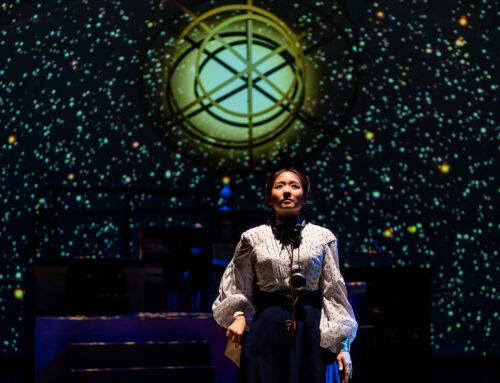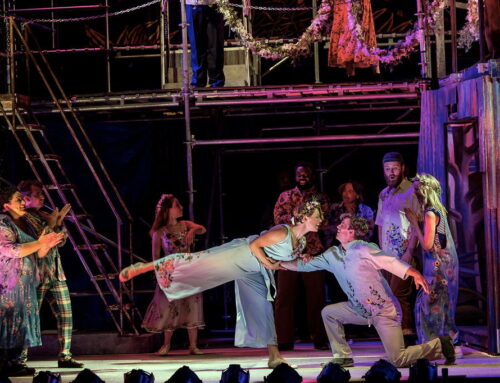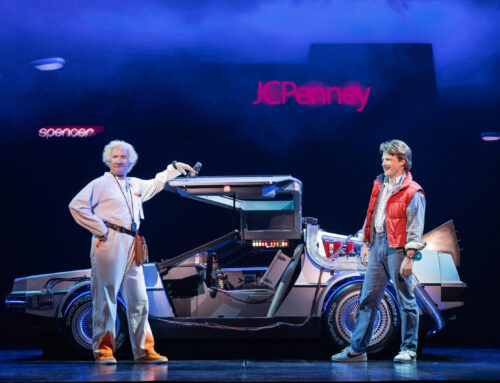CLYBOURNE PARK won the Tony for Best Play in 2012– and it’s hard to imagine a better production than what’s onstage at the SpeakEasy right now! Bruce Norris’s Pulitzer-Prize winning drama cracks open the racial divide and an earthquake of moral, ethical, familial and economic dilemmas reverberate through the echo chamber of history. The action picks up where Lorraine Hansberry’s classic A RAISIN IN THE SUN left off as a black family is about to move into a white neighborhood.
Act I of Clybourne Park, begins in 1959 inside the home of white home owners Bev (the divine Paula Plum) and her husband Russ (the daunting Thomas Derrah). They are packing up to leave with the help of their black housekeeper Francine (Marvelyn McFarlane). Family friend and minister Jim (Tim Spears) has also shown up (at Bev’s secret behest) for some informal counseling. Unbeknownst to them all, it’s a black family that is about to move in and the news is delivered by agitated neighbor (Michael Kaye) Karl–as in “Karl Lindner” from “RAISIN”) and his pregnant, deaf wife Betsy (Philana Mia). When Francine’s husband Albert (DeLance Minifee) arrives to pick up his wife, all the parties are in place as a torrent of racial resentments are unleashed.
Act II takes place 50 years later in 2009; the same home in what is now an African-American neighborhood is about to be purchased by a young white couple who meets with a neighborhood association concerned about the racial and economic repercussions of gentrification. The actors are all the same–Paula Plum is now Kathy a lawyer for Lindsey (Philana) and her husband Steve (Michael Kaye), MacFarlane and Minefee are now neighborhood association reps Lena and Kevin, while Tom Derrah–who in the first act, as Russ, buried something–now is a construction worker whose demolition crew is at the house unearthing secrets from the past.
The second act is a mirror image of the first–to humorous and illuminating effect. ACT I begins with a conversation about naming groups of people; Bev — channeling Archie Bunker’s wife Edith– wonders “what Neopolitan means” and what people from Naples are called. In Act II that conversation is echoed in a disagreement about the capital of Morocco– Marrakesh or Timbuktu? In Act I a loaded conversation about “who skis “and “who eats collard greens and pig’s feet,” becomes in Act II a litany of off-color jokes about anyone who’s marginalized: blacks, women, gays. The characters– all products of families now blended ethnically and economically– wrestle with a complex history that has seen the corner grocery in Clybourne Park go from “Gelman’s” in the 50’s to a SuperSaver and finally a Whole Foods in 2009. (click here for scene)
They gingerly make their way through a minefield of political correctness until Steve finally cuts through that “elaborate dance,” and ignites an explosive encounter capped off by a cringe-worthy tirade of politically incorrect jokes that will make you laugh and squirm. (click here to see the scene!) The cast delivers it all with perfect timing and authenticity, M. Bevin O’Gara’s direction allows for maximum transparency, while sets and costumes are true to period and tone.
Ultimately, as much as the play is about contemporary issues of racial stereotyping, gentrification, white guilt, class warfare, and property values, its thematic terrain runs deeper. The two halves of this meticulously structured drama are book-ended by a family tragedy which is connected to our deeply wired tribalism and sense of identity, and the way those boundaries ultimately cut us off from ourselves and each other. CLYBOURNE PARK hits close to home and begins with the story of one neighborhood– but it takes us much farther than a walk in any park.
DO NOT MISS SpeakEasy Stage Co.’s Boston Premiere of “CLYBOURNE PARK” through March 30 at the BCA’s Roberts Studio Theatre in the Calderwood Pavilion.






[…] and perpetually relevant– especially in concert with its latter day companion piece CLYBOURNE PARK now playing over at the Calderwood courtesy of SpeakEasy Stage. Clybourne Park is the name of the […]